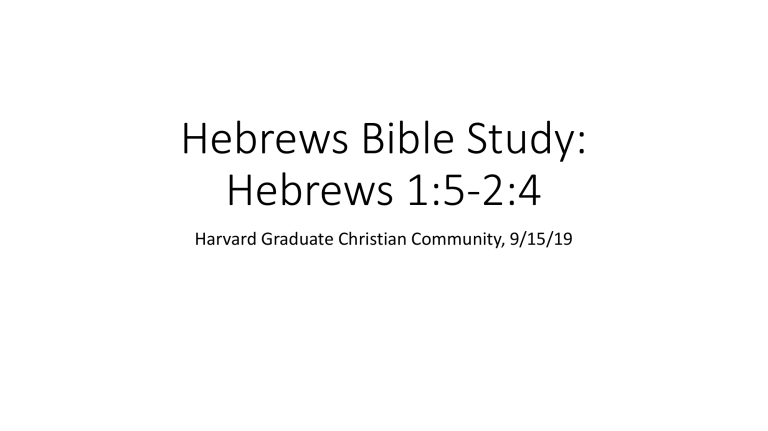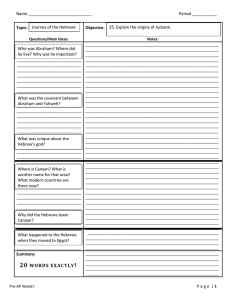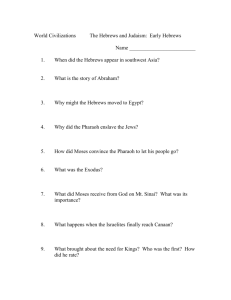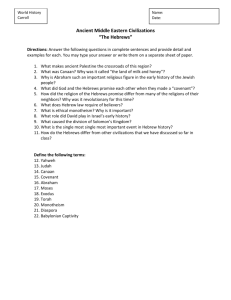
Hebrews Bible Study: Hebrews 1:5-2:4 Harvard Graduate Christian Community, 9/15/19 Hebrews 1: purpose and occasion Who was Hebrews written to? • Anonymous, although connected to Italy in some way (Heb. 13:24) • Presumes familiarity with the OT Scriptures • Content: addresses the question of how to read the OT in light of Jesus and the rejection of the sacrificial system and cultic regulations • Occasion: reminding the audience of what their faith truly stands for and why they should keep being committed to it Hebrews 1: recap Last session: Hebrews 1:1-4 1 Long ago, at many times and in many ways, God spoke to our fathers by the prophets, 2 but in these last days he has spoken to us by his Son, whom he appointed the heir of all things, through whom also he created the world. 3 He is the radiance of the glory of God and the exact imprint of his nature, and he upholds the universe by the word of his power. After making purification for sins, he sat down at the right hand of the Majesty on high, 4 having become as much superior to angels as the name he has inherited is more excellent than theirs. • Jesus is the Son of God • Jesus is the exact imprint of God and His perfect revelation • Jesus upholds the universe • Jesus made purification for sins, and is now exalted Hebrews 1 and Old Testament quotation Typological interpretation • Hebrew Scriptures are read as a prototype of God would eventually do and reveal Himself. • In this case, the Scriptures are read as talking about Jesus, sometimes even spoken by Jesus, as Jesus is viewed as the Messiah whom God has promised to Israel since the time of David (or even before). Royal psalms • Hebrews 1 quotes Psalms 2, 45, 97, 104, 110. • Psalms 2, 45, 110 are royal psalms: ostensibly written for the coronation of a king of Judah, but now typologically read as applying to Jesus. Tips for reading Hebrews 1:5-14 Central question: What can we learn about Jesus if we take these passages as referring to Him, as the author of Hebrews does? • Read the context of the quotations (especially the royal psalms). Hebrews audience would have been presumed to know the entire context. • Are these psalms better read as applying to a human king or the promised Messiah? How does typological interpretation change or enhance the meaning of the psalm? • What is the author claiming about Jesus? • How does Hebrews 1:5-14 connect to the claims about Jesus in 1:1-4? Activity: Group discussion Questions for Reflection 1. Examine the quotations from the Old Testament in verses 5-14. Read through Psalm 2, 2 Samuel 7:11-16, and Psalm 45:1-9 to get the context of these quotations (see attached sheet). Feel free to look up the context of the other quotations as well. 2. How are these quotations structured? What do they tell us about Jesus and how he differs from angels? 3. What do you think the point of using OT quotations (as opposed to arguing directly) is? Can you imagine how a person familiar with these Scriptures would respond to this chapter? 4. How does Heb. 1:5-14 fit with Heb. 1:1-4? What is the overall message of Hebrews 1? Hebrews 1:5-14 structure Three pairs of quotations + closing quotations 1. Verse 5: Psalm 2:7, 2 Samuel 7:14 2. Verses 6-7: Psalm 97:7, 104:4 3. Verses 8-12: Psalm 45:6-7, 102:25-27 4. Verse 13-14 (closing statement): Psalm 110:1 Application • Read Hebrews 2 In light of Hebrews 2:1-4, how do you think Hebrews 1 can be applied to our understanding of who Jesus is and His works? Does it affect how you view the significance of following Jesus?




